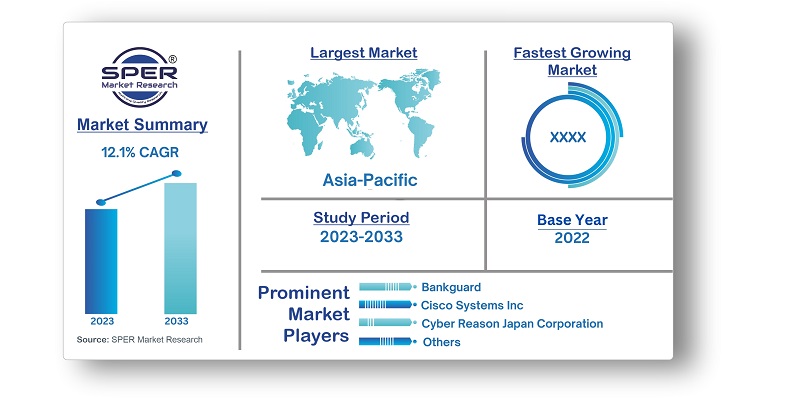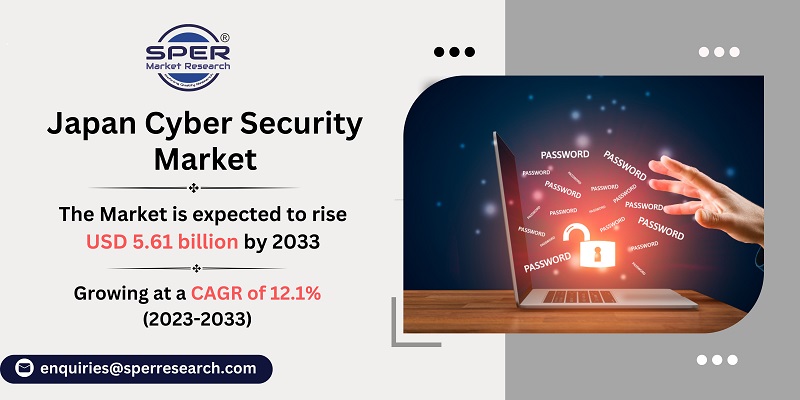
Japan Cybersecurity Market Growth, Trends, Size, Share, Revenue, Demand and Future Competition
Japan Cybersecurity Market Size- By Deployment, By End-User, By Application, By Component - Regional Outlook, Competitive Strategies, and Segment Forecast to 2033
| Published: Mar-2023 | Report ID: IACT2370 | Pages: 1 - 105 | Formats*: |
| Category : Information & Communications Technology | |||
- On July 2022, Kawasaki Kisen Kaisha, Ltd. (K Line) has announced the debut of an AI-powered cyber security platform. The firm installed Cybereason, a product of Cybereason Japan Corp., and adopted the company's monitoring and analysis service, Cybereason MDR (handled Detection & Response), in order to strengthen cyber security ship-shore communication in the ships that it handled.
- The growing need for zero-trust cybersecurity solutions that safeguard critical infrastructure has led to OPSWAT, the world leader in Critical Infrastructure Protection (CIP) cybersecurity solutions, announcing on April 20, 2023, ongoing commercial expansion and operational success in Japan. This rise is attributed by OPSWAT to their strategic partnership


| Report Metric | Details |
| Market size available for years | 2019-2033 |
| Base year considered | 2022 |
| Forecast period | 2023-2033 |
| Segments covered | By Deployment, By End-User, By Application, By Component |
| Regions covered | Kanto Region , Kinki Region , Central/ Chubu Region Kyushu-Okinawa Region , Tohoku Region ,Chugoku Region , Hokkaido Region , Shikoku Region |
| Companies Covered | Bankguard, Cisco Systems Inc., Cyber Reason Japan Corporation, Cyber Security Cloud, Inc., Digital Arts Inc., Flatt Security, GMO GlobalSign, Inc., IBM Corporation, internet Initiative Japan, Inc., Keychain, LAC Co. Ltd., NEC Corporation, SCSK Corporation |
- Businesses of all sizes
- Government agencies
- Non-profit organizations
- Educational institutions
- Individuals
- IT companies and service providers
- Healthcare providers
- Financial institutions
| By Application: |
|
| By Deployment Mode: |
|
| By End-User: |
|
| By Component: |
|
- Japan Cybersecurity Market Size (FY’2023-FY’2033)
- Overview of the Japan Cybersecurity Market
- Segmentation of Japan Cybersecurity Market By Application (Cloud, Consumer Security, Data Security, Identity Access Management, Infrastructure Protection, Network Security)
- Segmentation of Japan Cybersecurity Market By Deployment Mode (Cloud and On-premise)
- Segmentation of Japan Cybersecurity Market By End-User (BFSI, Government and defense, Healthcare, IT and Telecommunication, Manufacturing )
- Segmentation of Japan Cybersecurity Market By Component (Hardware and Software)
- Statistical Snap of Japan Cybersecurity Market
- Expansion Analysis of Japan Cybersecurity Market
- Problems and Obstacles in Japan Cybersecurity Market
- Competitive Landscape in the Japan Cybersecurity Market
- Impact of COVID-19 and Demonetization on Japan Cybersecurity Market
- Details on Current Investment in Japan Cybersecurity Market
- Competitive Analysis of Japan Cybersecurity Market
- Prominent Players in the Japan Cybersecurity Market
- SWOT Analysis of Japan Cybersecurity Market
- Japan Cybersecurity Market Future Outlook and Projections (FY’2023-FY’2033)
- Recommendations from Analyst
1.1. Scope of the report1.2. Market segment analysis
2.1. Research data source2.1.1. Secondary Data2.1.2. Primary Data2.1.3. SPER’s internal database2.1.4. Premium insight from KOL’s2.2. Market size estimation2.2.1. Top-down and Bottom-up approach2.3. Data triangulation
4.1. Driver, Restraint, Opportunity and Challenges Analysis4.1.1. Drivers4.1.2. Restraints4.1.3. Opportunities4.1.4. Challenges4.2. COVID-19 Impacts of the Japan Cybersecurity Market
5.1. SWOT Analysis5.1.1. Strengths5.1.2. Weaknesses5.1.3. Opportunities5.1.4. Threats5.2. PESTEL Analysis5.2.1. Political Landscape5.2.2. Economic Landscape5.2.3. Social Landscape5.2.4. Technological Landscape5.2.5. Environmental Landscape5.2.6. Legal Landscape5.3. PORTER’s Five Forces5.3.1. Bargaining power of suppliers5.3.2. Bargaining power of buyers5.3.3. Threat of Substitute5.3.4. Threat of new entrant5.3.5. Competitive rivalry5.4. Heat Map Analysis
6.1. Japan Cybersecurity Market Manufacturing Base Distribution, Sales Area, Product Type6.2. Mergers & Acquisitions, Partnerships, Product Launch, and Collaboration in Japan Cybersecurity Market
7.1. Japan Cybersecurity Market Value Share and Forecast, By Application, 2023-20337.2. Cloud7.3. Consumer Security7.4. Data Security7.5. Identity Access Management7.6. Infrastructure Protection7.7. Network Security
8.1. Japan Cybersecurity Market Value Share and Forecast, By Deployment Mode, 2023-20338.2. Cloud8.3. On-Premise
9.1. Japan Cybersecurity Market Value Share and Forecast, By End-User, 2023-20339.2. BFSI9.3. Government and defense9.4. Healthcare9.5. IT and Telecommunication9.6. Manufacturing
10.1. Japan Cybersecurity Market Value Share and Forecast, By Component, 2023-203310.2. Hardware10.3. Software
11.1. Japan Cybersecurity Market Size and Market Share
12.1. Japan Cybersecurity Market Size and Market Share By Application, (2019-2026)12.2. Japan Cybersecurity Market Size and Market Share By Application, (2027-2033)
13.1. Japan Cybersecurity Market Size and Market Share By Deployment Mode (2019-2026)13.2. Japan Cybersecurity Market Size and Market Share By Deployment Mode (2027-2033)
14.1. Japan Cybersecurity Market Size and Market Share By Component, (2019-2026)14.2. Japan Cybersecurity Market Size and Market Share By Component, (2027-2033)
15.1. Japan Cybersecurity Market Size and Market Share By End-User, (2019-2026)15.2. Japan Cybersecurity Market Size and Market Share By End-User, (2027-2033)
16.1. Japan Cybersecurity Market Size and Market Share By Region (2019-2026)16.2. Japan Cybersecurity Market Size and Market Share By Region (2027-2033)16.3. Kanto Region16.4. Kinki Region16.5. Central/ Chubu Region16.6. Kyushu-Okinawa Region16.7. Tohoku Region16.8. Chugoku Region16.9. Hokkaido Region16.10. Shikoku Region
17.1. Bankguard17.1.1. Company details17.1.2. Financial outlook17.1.3. Product summary17.1.4. Recent developments17.2. Cisco Systems17.2.1. Company details17.2.2. Financial outlook17.2.3. Product summary17.2.4. Recent developments17.3. Cyber Reason Japan Corporation17.3.1. Company details17.3.2. Financial outlook17.3.3. Product summary17.3.4. Recent developments17.4. Cyber Security cloud, Inc.17.4.1. Company details17.4.2. Financial outlook17.4.3. Product summary17.4.4. Recent developments17.5. Digital Arts, Inc.17.5.1. Company details17.5.2. Financial outlook17.5.3. Product summary17.5.4. Recent developments17.6. Flatt Security17.6.1. Company details17.6.2. Financial outlook17.6.3. Product summary17.6.4. Recent developments17.7. GMO GlobalSign, Inc.17.7.1. Company details17.7.2. Financial outlook17.7.3. Product summary17.7.4. Recent developments17.8. IBM Corporation17.8.1. Company details17.8.2. Financial outlook17.8.3. Product summary17.8.4. Recent developments17.9. Internet Initiative Japan, Inc.17.9.1. Company details17.9.2. Financial outlook17.9.3. Product summary17.9.4. Recent developments17.10. Keychain17.10.1. Company details17.10.2. Financial outlook17.10.3. Product summary17.10.4. Recent developments17.11. Others
SPER Market Research’s methodology uses great emphasis on primary research to ensure that the market intelligence insights are up to date, reliable and accurate. Primary interviews are done with players involved in each phase of a supply chain to analyze the market forecasting. The secondary research method is used to help you fully understand how the future markets and the spending patterns look likes.
The report is based on in-depth qualitative and quantitative analysis of the Product Market. The quantitative analysis involves the application of various projection and sampling techniques. The qualitative analysis involves primary interviews, surveys, and vendor briefings. The data gathered as a result of these processes are validated through experts opinion. Our research methodology entails an ideal mixture of primary and secondary initiatives.



Frequently Asked Questions About This Report
PLACE AN ORDER
Year End Discount
Sample Report
Pre-Purchase Inquiry
NEED CUSTOMIZATION?
Request CustomizationCALL OR EMAIL US
100% Secure Payment






Related Reports
Our Global Clients
Our data-driven insights have influenced the strategy of 200+ reputed companies across the globe.




















